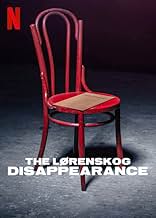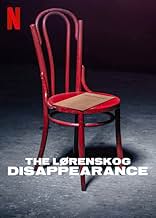La Disparue de Lørenskog
Titre original : Forsvinningen - Lørenskog 31. oktober 2018
NOTE IMDb
6,0/10
3,2 k
MA NOTE
Lorsque la femme d'un millionnaire disparaît, la police doit faire face à la frénésie des médias et à des indics véreux pour découvrir la vérité. Inspiré de faits réels.Lorsque la femme d'un millionnaire disparaît, la police doit faire face à la frénésie des médias et à des indics véreux pour découvrir la vérité. Inspiré de faits réels.Lorsque la femme d'un millionnaire disparaît, la police doit faire face à la frénésie des médias et à des indics véreux pour découvrir la vérité. Inspiré de faits réels.
Parcourir les épisodes
Avis à la une
Vaguely remember the case on which this series is based. It was also relatively well reported here in Finland. The series follows events from different angles and perspectives. The series is followed episode by episode from the point of view of the police, lawyers, journalists and relatives.
I used to be in favour of a non-linear and multi-perspective series. Over time, however, the problem has become that these elements have become a way of prolonging the series without adding any value to the story itself or depth to the characters. I like slow-burning series, but there has to be a reason for that slow-burning. Nowadays, many series should just be a 1,5h movie because there is no true content for many episodes.
Fortunately, however, this series was different. Five episodes of guaranteed quality. I found that I actually liked almost every character in the series. I could relate to their perspectives and attitudes. The series illustrates well how easily our history and temperament can affect our ability to look at things objectively.
I also liked the fact that the personal lives of the main characters were referred and shown, but mostly in a condensed form. Glimpses. Everyone can then draw their own conclusions. For example, many police series stray far too much from the plot itself to deal with family traumas and other relationship issues. Of course, human being is a whole, but often too much emphasis is placed on these subplots.
Many people seem to be annoyed by the end of the series. The series is largely based on real events, including the names. In such cases, you cannot make your own artistic decisions. Personally, I liked the ending of the series. The way it affected the lives of the people involved.
It also reminded me of a case we had here in Finland. It was the case of Anneli Auer. She supposedly murdered her husband. However, the director of the investigation forbid the investigators of investigating Anneli Auer, even though she was the wife of the murdered and was present when the murder took place. Anneli Auer is an obvious psychopath and she was very good at manipulation. Anneli Auer was not taken as a suspect until two years after the murder, at which point no proper investigation could be carried out. The court acquitted Anneli Auer, even though she is very probably behind the murder of her husband. It really reminded this case in many ways.
I used to be in favour of a non-linear and multi-perspective series. Over time, however, the problem has become that these elements have become a way of prolonging the series without adding any value to the story itself or depth to the characters. I like slow-burning series, but there has to be a reason for that slow-burning. Nowadays, many series should just be a 1,5h movie because there is no true content for many episodes.
Fortunately, however, this series was different. Five episodes of guaranteed quality. I found that I actually liked almost every character in the series. I could relate to their perspectives and attitudes. The series illustrates well how easily our history and temperament can affect our ability to look at things objectively.
I also liked the fact that the personal lives of the main characters were referred and shown, but mostly in a condensed form. Glimpses. Everyone can then draw their own conclusions. For example, many police series stray far too much from the plot itself to deal with family traumas and other relationship issues. Of course, human being is a whole, but often too much emphasis is placed on these subplots.
Many people seem to be annoyed by the end of the series. The series is largely based on real events, including the names. In such cases, you cannot make your own artistic decisions. Personally, I liked the ending of the series. The way it affected the lives of the people involved.
It also reminded me of a case we had here in Finland. It was the case of Anneli Auer. She supposedly murdered her husband. However, the director of the investigation forbid the investigators of investigating Anneli Auer, even though she was the wife of the murdered and was present when the murder took place. Anneli Auer is an obvious psychopath and she was very good at manipulation. Anneli Auer was not taken as a suspect until two years after the murder, at which point no proper investigation could be carried out. The court acquitted Anneli Auer, even though she is very probably behind the murder of her husband. It really reminded this case in many ways.
Fascinating, detailed, intriguing examination of a real-life missing person case. Each episode follows one of the parties involved, ie the police, the journalists, the lawyers, and the story emerges from this fractured looking glass. All good and original and engaging so far. However, when it comes to the 5th and final episode, this series simply just pulls up the drawbridge on the story and gives nothing to the viewer by way of theory, explanation, new perspective. OK it's a 'true' story, more or less, and as such the jury is still out and no one has been convicted. But ending the series with little more than a shrug just confirms this as s a TV experience this is just a distraction for a few hours and with nothing to contribute to the subject it asks us to consider. To be avoided.
I stayed with this unusual mystery drama from Norway right to the end, but really rather wish I hadn't. It's claimed that the story was based on real-life events, but if that really was the case, then truth must indeed be stranger than fiction.
A middle-aged woman is forcibly kidnapped from her home while her billionaire husband is away. But no ransom note is immediately forthcoming and as home truths emerge about the state of the couple's marriage and in particular the elderly husband's extra-marital life, the mystery grows with every passing day, the latter documented by periodic datelines coming up on screen.
The two main cops assigned to the case are a woman and man team, she, a white woman, the dogged proceedural type, he, a younger black man, willing to think and work outside the box to try to crack the case, even if it means engaging with the criminal fraternity. The woman, as is commonplace in dramas like this, has family issues, in the form of her father who suffers from Alzheimer's Disease.
Also on the case is a determined crime reporter from a daily national newspaper who finally gets a break which takes him to Sweden, but unfortunately for him he's identified and gets badly beaten up for his trouble. It all goes down or so you're led to believe, to a climactic conclusion which at least from where I was sitting, seemed to leave the viewer high and dry.
Up until that point, it was just about okay as these Scandi-noir series go. With each episode coming at the story from a different angle, I found it too difficult to join the dots in the narrative which may have contributed to my disillusionment and dissatisfaction with the ending.
I appreciate that the original and unusual prismatic format adopted here may have been an attempt to freshen up the genre, but for me, it just felt like I was led up the path and in the end left absolutely nowhere by an over-enigmatic ending.
A middle-aged woman is forcibly kidnapped from her home while her billionaire husband is away. But no ransom note is immediately forthcoming and as home truths emerge about the state of the couple's marriage and in particular the elderly husband's extra-marital life, the mystery grows with every passing day, the latter documented by periodic datelines coming up on screen.
The two main cops assigned to the case are a woman and man team, she, a white woman, the dogged proceedural type, he, a younger black man, willing to think and work outside the box to try to crack the case, even if it means engaging with the criminal fraternity. The woman, as is commonplace in dramas like this, has family issues, in the form of her father who suffers from Alzheimer's Disease.
Also on the case is a determined crime reporter from a daily national newspaper who finally gets a break which takes him to Sweden, but unfortunately for him he's identified and gets badly beaten up for his trouble. It all goes down or so you're led to believe, to a climactic conclusion which at least from where I was sitting, seemed to leave the viewer high and dry.
Up until that point, it was just about okay as these Scandi-noir series go. With each episode coming at the story from a different angle, I found it too difficult to join the dots in the narrative which may have contributed to my disillusionment and dissatisfaction with the ending.
I appreciate that the original and unusual prismatic format adopted here may have been an attempt to freshen up the genre, but for me, it just felt like I was led up the path and in the end left absolutely nowhere by an over-enigmatic ending.
A police procedural/investigative journalism series set in 2018 and following in Lørenskog, Norway. It's based on an actual case concerning a wealthy entrepreneur and the mysterious disappearance of his wife.
Each 50-minute episode looks at a different facet of the investigation, though the flow is chronological. Anne-Elisabeth Hagen is kidnapped at the beginning of the first episode. Her husband, Tom (Terje Strømdahl), is a wealthy billionaire. The kidnappers make ransom demands.
Jorunn Lakke (Yngvild Støen Grotmol) leads the police investigation along with her partner, Micael Delvir (Kidane Gjølme Dalva). Erlend Moe Riise (Christian Rubeck) is the lead journalist for the local paper; he appears to have informants within the police department that give him tips to influence the coverage. Aleks Zaretski (Victoria Ose) is another journalist who thinks the newspaper should pursue more theories.
The investigation stretches over two years as police and journalists encounter deadends, unconfirmed circumstantial evidence, questionable procedures, and unreliable sources. In addition, they encounter many potential villains, including Tom Hagen. Nevertheless, the story's final resolution is realistic.
This movie was fascinating to watch in the context of the "She said" film I recently watched that touted the necessity and doggedness of good investigative journalism. "The Lørenskog Disappearance" is more ambiguous, raising questions about the relationship between the press and the police and the possibility of tunnel vision hindering both investigations. I thought it was well done, though several storylines were left undeveloped, and a relatively large array of bad guys made following things difficult.
Each 50-minute episode looks at a different facet of the investigation, though the flow is chronological. Anne-Elisabeth Hagen is kidnapped at the beginning of the first episode. Her husband, Tom (Terje Strømdahl), is a wealthy billionaire. The kidnappers make ransom demands.
Jorunn Lakke (Yngvild Støen Grotmol) leads the police investigation along with her partner, Micael Delvir (Kidane Gjølme Dalva). Erlend Moe Riise (Christian Rubeck) is the lead journalist for the local paper; he appears to have informants within the police department that give him tips to influence the coverage. Aleks Zaretski (Victoria Ose) is another journalist who thinks the newspaper should pursue more theories.
The investigation stretches over two years as police and journalists encounter deadends, unconfirmed circumstantial evidence, questionable procedures, and unreliable sources. In addition, they encounter many potential villains, including Tom Hagen. Nevertheless, the story's final resolution is realistic.
This movie was fascinating to watch in the context of the "She said" film I recently watched that touted the necessity and doggedness of good investigative journalism. "The Lørenskog Disappearance" is more ambiguous, raising questions about the relationship between the press and the police and the possibility of tunnel vision hindering both investigations. I thought it was well done, though several storylines were left undeveloped, and a relatively large array of bad guys made following things difficult.
Summary
The novelty of this cold and intelligent Norwegian series based on a real case is that each chapter focuses on one of the sectors involved in the case and as the investigation progresses.
Review
This Norwegian mini-series based on a true case recounts the investigation of the disappearance of the wife of a Norwegian billionaire, in what appears to be a kidnapping.
The novelty of this series lies in the fact that each chapter focuses on one of the groups involved in the case and as the investigation progresses, for example: the first focuses on the police and prosecutors, the next on the journalists who investigate the case, and so on. The change of point of view then does not imply flashbacks that return to certain events, in general, nor the absence of the other protagonists, who circumstantially pass into the background. I must add that there would be some important stratum missing as the protagonist of some chapter...
The tone of the series is cold but its notes on how these groups are related and how prejudices and personal stories work in their working hypotheses are very interesting (particularly in the case of the press) as well as on the role of cryptocurrencies in kidnapping for ransom.
Needless to say, the ending is disappointing, and for more than one reason (which I can't reveal).
The novelty of this cold and intelligent Norwegian series based on a real case is that each chapter focuses on one of the sectors involved in the case and as the investigation progresses.
Review
This Norwegian mini-series based on a true case recounts the investigation of the disappearance of the wife of a Norwegian billionaire, in what appears to be a kidnapping.
The novelty of this series lies in the fact that each chapter focuses on one of the groups involved in the case and as the investigation progresses, for example: the first focuses on the police and prosecutors, the next on the journalists who investigate the case, and so on. The change of point of view then does not imply flashbacks that return to certain events, in general, nor the absence of the other protagonists, who circumstantially pass into the background. I must add that there would be some important stratum missing as the protagonist of some chapter...
The tone of the series is cold but its notes on how these groups are related and how prejudices and personal stories work in their working hypotheses are very interesting (particularly in the case of the press) as well as on the role of cryptocurrencies in kidnapping for ransom.
Needless to say, the ending is disappointing, and for more than one reason (which I can't reveal).
Le saviez-vous
- AnecdotesToutes les informations contiennent des spoilers
Meilleurs choix
Connectez-vous pour évaluer et suivre la liste de favoris afin de recevoir des recommandations personnalisées
- How many seasons does The Lørenskog Disappearance have?Alimenté par Alexa
Détails
- Date de sortie
- Pays d’origine
- Site officiel
- Langue
- Aussi connu sous le nom de
- The Lørenskog Disappearance
- Société de production
- Voir plus de crédits d'entreprise sur IMDbPro
- Durée52 minutes
- Couleur
- Mixage
Contribuer à cette page
Suggérer une modification ou ajouter du contenu manquant


























